University Nursing Module: Reflection on Nursing Experiences
VerifiedAdded on 2020/04/15
|18
|4128
|65
Report
AI Summary
This assignment presents a reflection on two distinct experiences encountered within a nursing context, utilizing the Gibbs reflective cycle as a framework for analysis. The first scenario involves a colleague's breach of patient confidentiality, while the second focuses on a pharmacist's failure to adhere to proper hand hygiene protocols. The reflection systematically progresses through the stages of the Gibbs cycle: description, feelings, evaluation, analysis, conclusion, and action plan. In the first incident, the author reflects on the shock and dilemma of witnessing a colleague accessing patient information inappropriately. The author's evaluation reveals a weakness in multitasking skills, a key component of effective leadership and management. The second incident highlights the author's timidity in addressing the pharmacist's breach of hand hygiene guidelines, leading to the evaluation of communication skills. The analysis further delves into the implications of each situation, considering training deficiencies and adherence to professional responsibilities. The conclusion outlines alternative actions that could have been taken to improve outcomes. The author emphasizes the importance of direct communication and proactive intervention to uphold professional standards and ensure patient safety. This reflection highlights the significance of continuous self-assessment in promoting best practices within the nursing profession.
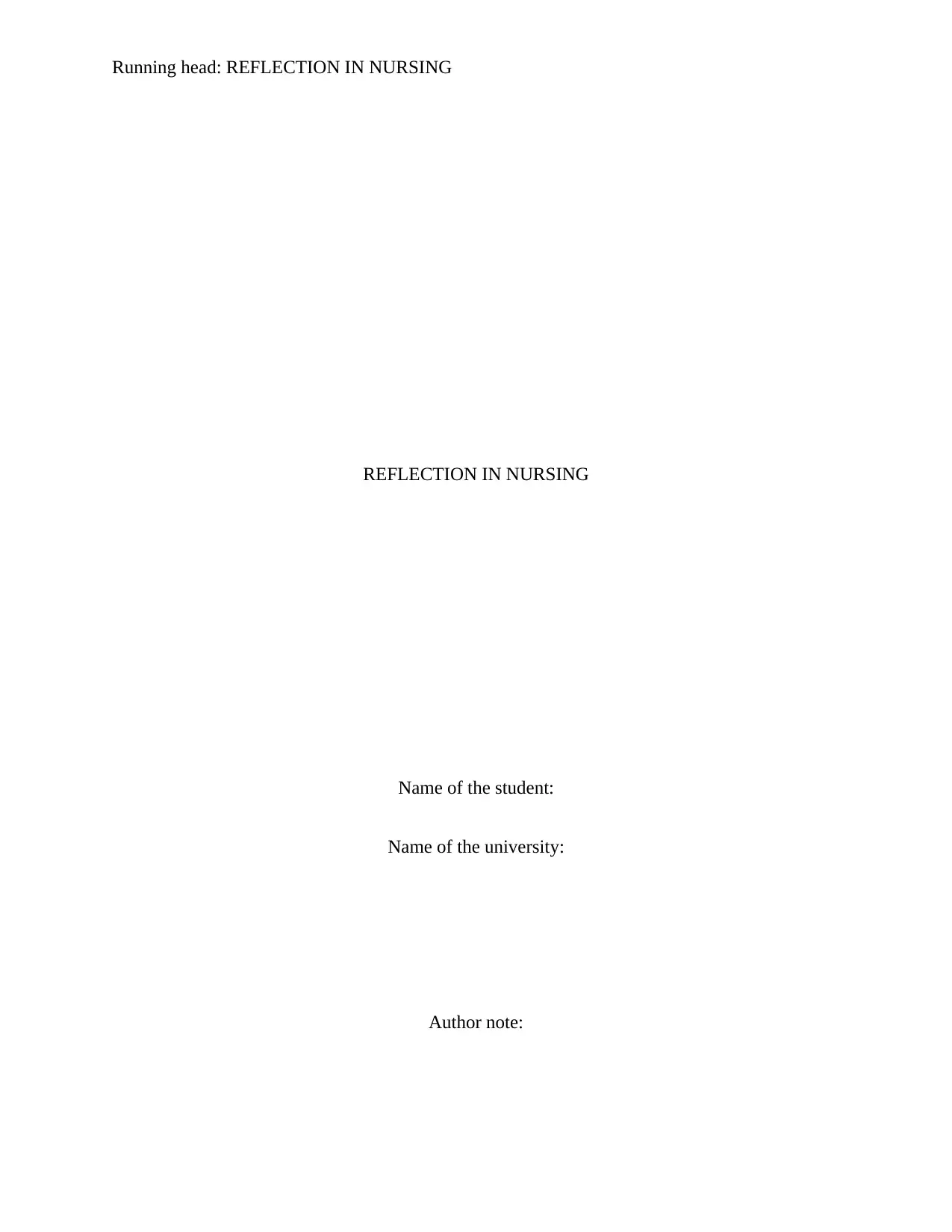
Running head: REFLECTION IN NURSING
REFLECTION IN NURSING
Name of the student:
Name of the university:
Author note:
REFLECTION IN NURSING
Name of the student:
Name of the university:
Author note:
Paraphrase This Document
Need a fresh take? Get an instant paraphrase of this document with our AI Paraphraser
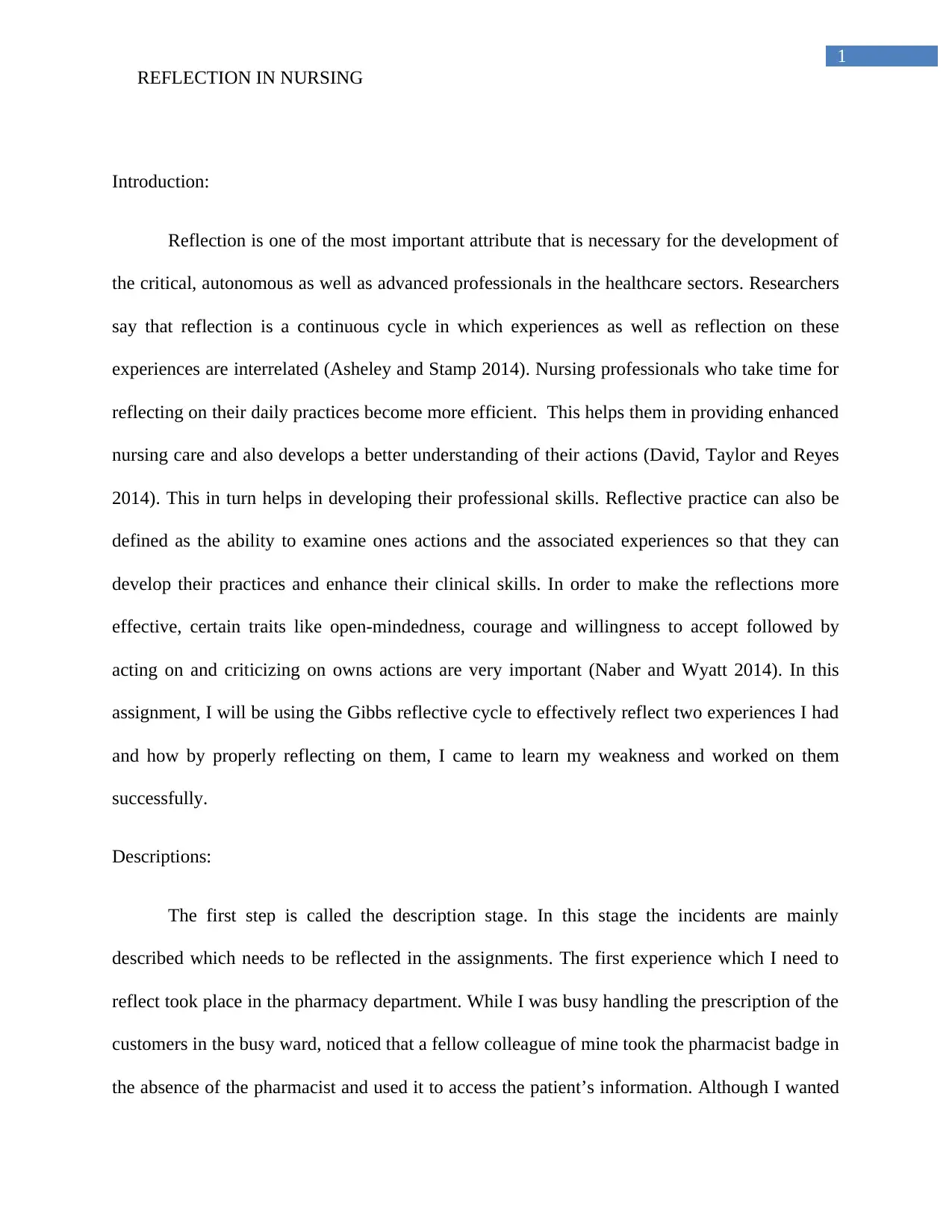
1
REFLECTION IN NURSING
Introduction:
Reflection is one of the most important attribute that is necessary for the development of
the critical, autonomous as well as advanced professionals in the healthcare sectors. Researchers
say that reflection is a continuous cycle in which experiences as well as reflection on these
experiences are interrelated (Asheley and Stamp 2014). Nursing professionals who take time for
reflecting on their daily practices become more efficient. This helps them in providing enhanced
nursing care and also develops a better understanding of their actions (David, Taylor and Reyes
2014). This in turn helps in developing their professional skills. Reflective practice can also be
defined as the ability to examine ones actions and the associated experiences so that they can
develop their practices and enhance their clinical skills. In order to make the reflections more
effective, certain traits like open-mindedness, courage and willingness to accept followed by
acting on and criticizing on owns actions are very important (Naber and Wyatt 2014). In this
assignment, I will be using the Gibbs reflective cycle to effectively reflect two experiences I had
and how by properly reflecting on them, I came to learn my weakness and worked on them
successfully.
Descriptions:
The first step is called the description stage. In this stage the incidents are mainly
described which needs to be reflected in the assignments. The first experience which I need to
reflect took place in the pharmacy department. While I was busy handling the prescription of the
customers in the busy ward, noticed that a fellow colleague of mine took the pharmacist badge in
the absence of the pharmacist and used it to access the patient’s information. Although I wanted
REFLECTION IN NURSING
Introduction:
Reflection is one of the most important attribute that is necessary for the development of
the critical, autonomous as well as advanced professionals in the healthcare sectors. Researchers
say that reflection is a continuous cycle in which experiences as well as reflection on these
experiences are interrelated (Asheley and Stamp 2014). Nursing professionals who take time for
reflecting on their daily practices become more efficient. This helps them in providing enhanced
nursing care and also develops a better understanding of their actions (David, Taylor and Reyes
2014). This in turn helps in developing their professional skills. Reflective practice can also be
defined as the ability to examine ones actions and the associated experiences so that they can
develop their practices and enhance their clinical skills. In order to make the reflections more
effective, certain traits like open-mindedness, courage and willingness to accept followed by
acting on and criticizing on owns actions are very important (Naber and Wyatt 2014). In this
assignment, I will be using the Gibbs reflective cycle to effectively reflect two experiences I had
and how by properly reflecting on them, I came to learn my weakness and worked on them
successfully.
Descriptions:
The first step is called the description stage. In this stage the incidents are mainly
described which needs to be reflected in the assignments. The first experience which I need to
reflect took place in the pharmacy department. While I was busy handling the prescription of the
customers in the busy ward, noticed that a fellow colleague of mine took the pharmacist badge in
the absence of the pharmacist and used it to access the patient’s information. Although I wanted
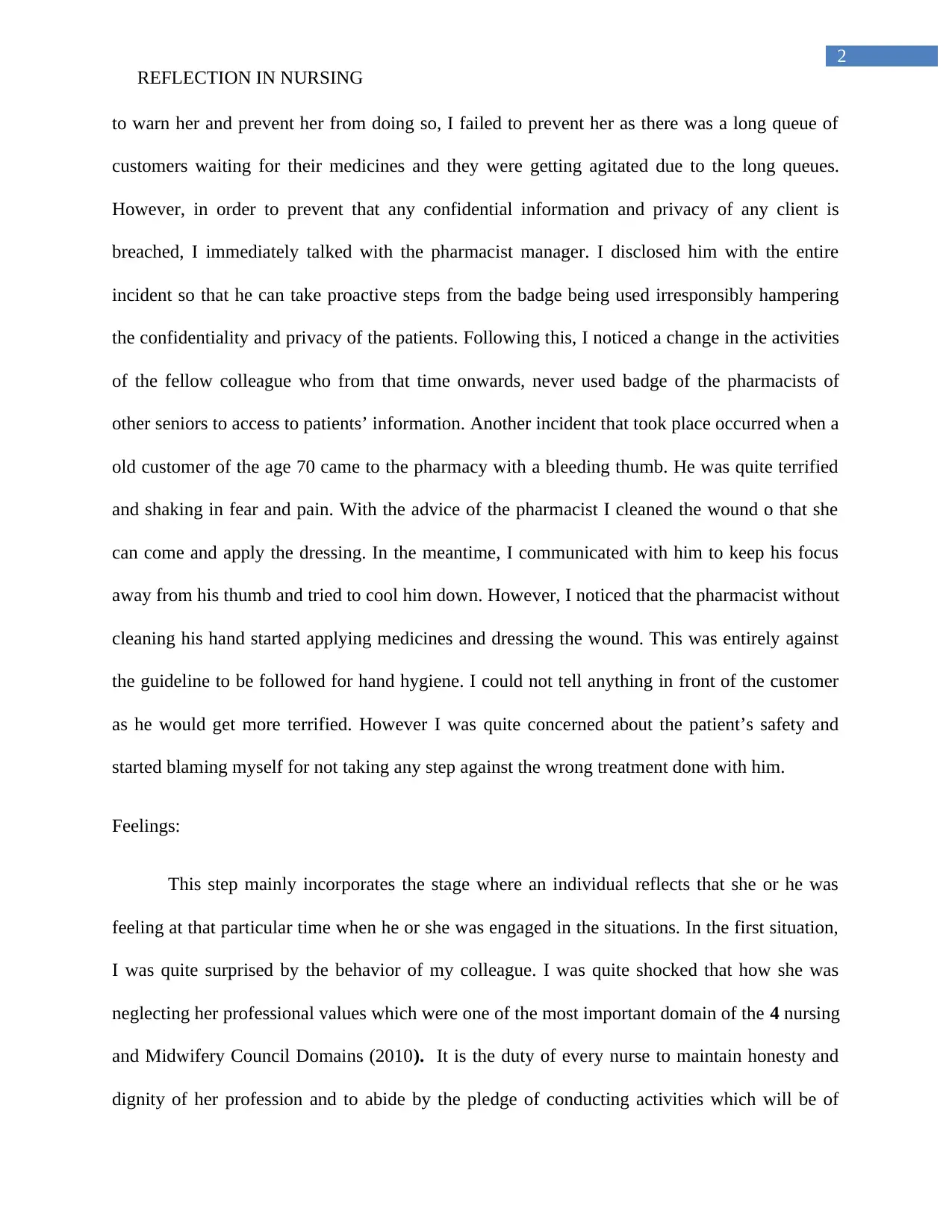
2
REFLECTION IN NURSING
to warn her and prevent her from doing so, I failed to prevent her as there was a long queue of
customers waiting for their medicines and they were getting agitated due to the long queues.
However, in order to prevent that any confidential information and privacy of any client is
breached, I immediately talked with the pharmacist manager. I disclosed him with the entire
incident so that he can take proactive steps from the badge being used irresponsibly hampering
the confidentiality and privacy of the patients. Following this, I noticed a change in the activities
of the fellow colleague who from that time onwards, never used badge of the pharmacists of
other seniors to access to patients’ information. Another incident that took place occurred when a
old customer of the age 70 came to the pharmacy with a bleeding thumb. He was quite terrified
and shaking in fear and pain. With the advice of the pharmacist I cleaned the wound o that she
can come and apply the dressing. In the meantime, I communicated with him to keep his focus
away from his thumb and tried to cool him down. However, I noticed that the pharmacist without
cleaning his hand started applying medicines and dressing the wound. This was entirely against
the guideline to be followed for hand hygiene. I could not tell anything in front of the customer
as he would get more terrified. However I was quite concerned about the patient’s safety and
started blaming myself for not taking any step against the wrong treatment done with him.
Feelings:
This step mainly incorporates the stage where an individual reflects that she or he was
feeling at that particular time when he or she was engaged in the situations. In the first situation,
I was quite surprised by the behavior of my colleague. I was quite shocked that how she was
neglecting her professional values which were one of the most important domain of the 4 nursing
and Midwifery Council Domains (2010). It is the duty of every nurse to maintain honesty and
dignity of her profession and to abide by the pledge of conducting activities which will be of
REFLECTION IN NURSING
to warn her and prevent her from doing so, I failed to prevent her as there was a long queue of
customers waiting for their medicines and they were getting agitated due to the long queues.
However, in order to prevent that any confidential information and privacy of any client is
breached, I immediately talked with the pharmacist manager. I disclosed him with the entire
incident so that he can take proactive steps from the badge being used irresponsibly hampering
the confidentiality and privacy of the patients. Following this, I noticed a change in the activities
of the fellow colleague who from that time onwards, never used badge of the pharmacists of
other seniors to access to patients’ information. Another incident that took place occurred when a
old customer of the age 70 came to the pharmacy with a bleeding thumb. He was quite terrified
and shaking in fear and pain. With the advice of the pharmacist I cleaned the wound o that she
can come and apply the dressing. In the meantime, I communicated with him to keep his focus
away from his thumb and tried to cool him down. However, I noticed that the pharmacist without
cleaning his hand started applying medicines and dressing the wound. This was entirely against
the guideline to be followed for hand hygiene. I could not tell anything in front of the customer
as he would get more terrified. However I was quite concerned about the patient’s safety and
started blaming myself for not taking any step against the wrong treatment done with him.
Feelings:
This step mainly incorporates the stage where an individual reflects that she or he was
feeling at that particular time when he or she was engaged in the situations. In the first situation,
I was quite surprised by the behavior of my colleague. I was quite shocked that how she was
neglecting her professional values which were one of the most important domain of the 4 nursing
and Midwifery Council Domains (2010). It is the duty of every nurse to maintain honesty and
dignity of her profession and to abide by the pledge of conducting activities which will be of
⊘ This is a preview!⊘
Do you want full access?
Subscribe today to unlock all pages.

Trusted by 1+ million students worldwide
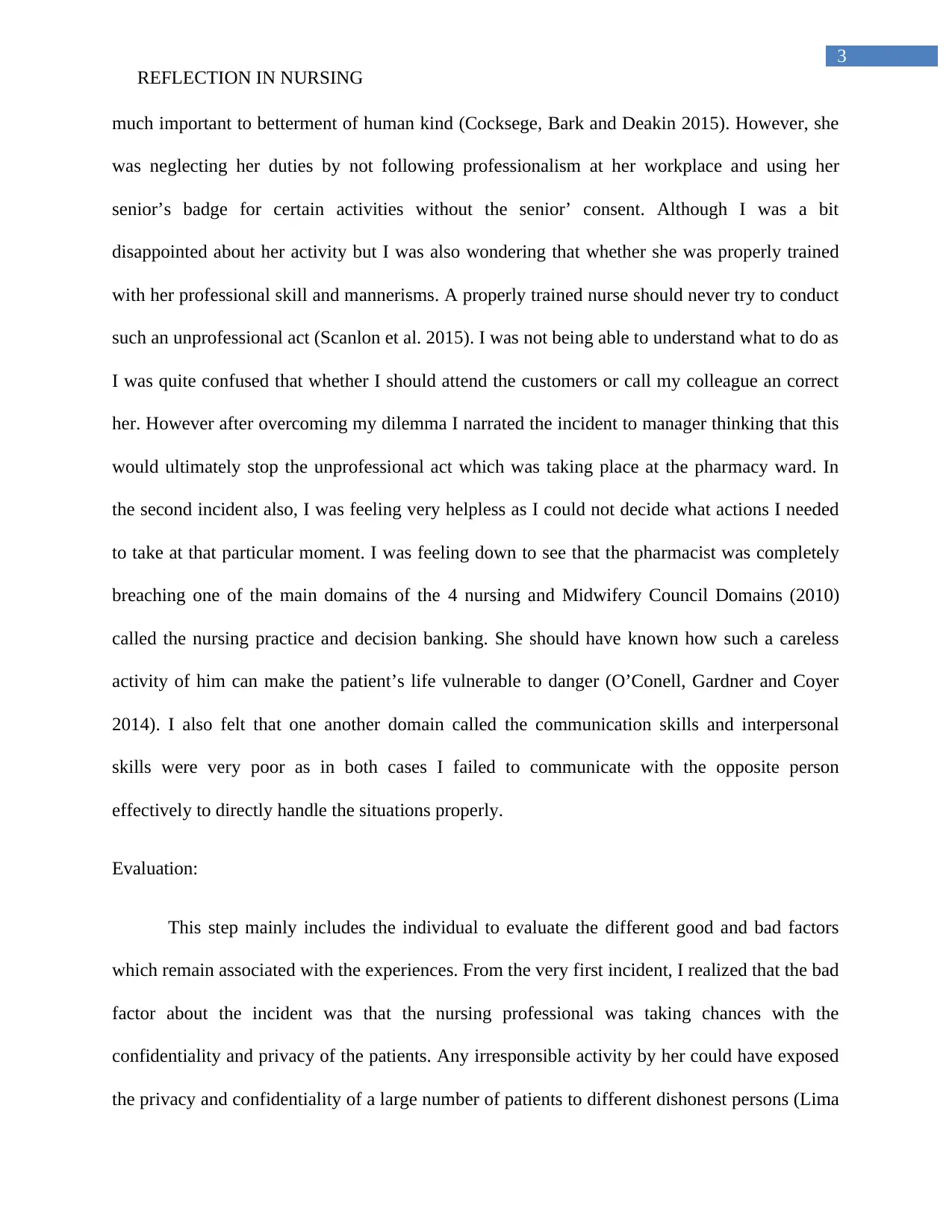
3
REFLECTION IN NURSING
much important to betterment of human kind (Cocksege, Bark and Deakin 2015). However, she
was neglecting her duties by not following professionalism at her workplace and using her
senior’s badge for certain activities without the senior’ consent. Although I was a bit
disappointed about her activity but I was also wondering that whether she was properly trained
with her professional skill and mannerisms. A properly trained nurse should never try to conduct
such an unprofessional act (Scanlon et al. 2015). I was not being able to understand what to do as
I was quite confused that whether I should attend the customers or call my colleague an correct
her. However after overcoming my dilemma I narrated the incident to manager thinking that this
would ultimately stop the unprofessional act which was taking place at the pharmacy ward. In
the second incident also, I was feeling very helpless as I could not decide what actions I needed
to take at that particular moment. I was feeling down to see that the pharmacist was completely
breaching one of the main domains of the 4 nursing and Midwifery Council Domains (2010)
called the nursing practice and decision banking. She should have known how such a careless
activity of him can make the patient’s life vulnerable to danger (O’Conell, Gardner and Coyer
2014). I also felt that one another domain called the communication skills and interpersonal
skills were very poor as in both cases I failed to communicate with the opposite person
effectively to directly handle the situations properly.
Evaluation:
This step mainly includes the individual to evaluate the different good and bad factors
which remain associated with the experiences. From the very first incident, I realized that the bad
factor about the incident was that the nursing professional was taking chances with the
confidentiality and privacy of the patients. Any irresponsible activity by her could have exposed
the privacy and confidentiality of a large number of patients to different dishonest persons (Lima
REFLECTION IN NURSING
much important to betterment of human kind (Cocksege, Bark and Deakin 2015). However, she
was neglecting her duties by not following professionalism at her workplace and using her
senior’s badge for certain activities without the senior’ consent. Although I was a bit
disappointed about her activity but I was also wondering that whether she was properly trained
with her professional skill and mannerisms. A properly trained nurse should never try to conduct
such an unprofessional act (Scanlon et al. 2015). I was not being able to understand what to do as
I was quite confused that whether I should attend the customers or call my colleague an correct
her. However after overcoming my dilemma I narrated the incident to manager thinking that this
would ultimately stop the unprofessional act which was taking place at the pharmacy ward. In
the second incident also, I was feeling very helpless as I could not decide what actions I needed
to take at that particular moment. I was feeling down to see that the pharmacist was completely
breaching one of the main domains of the 4 nursing and Midwifery Council Domains (2010)
called the nursing practice and decision banking. She should have known how such a careless
activity of him can make the patient’s life vulnerable to danger (O’Conell, Gardner and Coyer
2014). I also felt that one another domain called the communication skills and interpersonal
skills were very poor as in both cases I failed to communicate with the opposite person
effectively to directly handle the situations properly.
Evaluation:
This step mainly includes the individual to evaluate the different good and bad factors
which remain associated with the experiences. From the very first incident, I realized that the bad
factor about the incident was that the nursing professional was taking chances with the
confidentiality and privacy of the patients. Any irresponsible activity by her could have exposed
the privacy and confidentiality of a large number of patients to different dishonest persons (Lima
Paraphrase This Document
Need a fresh take? Get an instant paraphrase of this document with our AI Paraphraser
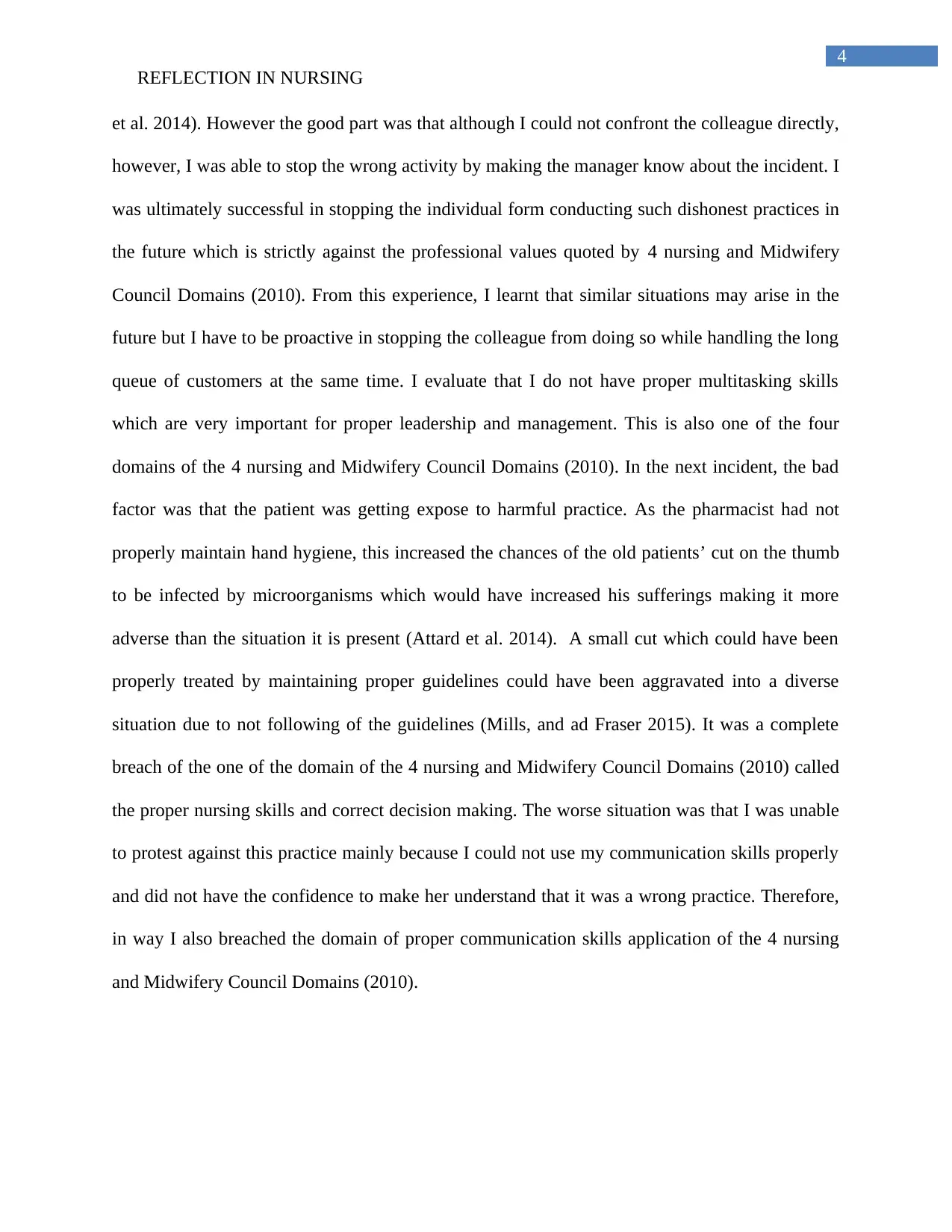
4
REFLECTION IN NURSING
et al. 2014). However the good part was that although I could not confront the colleague directly,
however, I was able to stop the wrong activity by making the manager know about the incident. I
was ultimately successful in stopping the individual form conducting such dishonest practices in
the future which is strictly against the professional values quoted by 4 nursing and Midwifery
Council Domains (2010). From this experience, I learnt that similar situations may arise in the
future but I have to be proactive in stopping the colleague from doing so while handling the long
queue of customers at the same time. I evaluate that I do not have proper multitasking skills
which are very important for proper leadership and management. This is also one of the four
domains of the 4 nursing and Midwifery Council Domains (2010). In the next incident, the bad
factor was that the patient was getting expose to harmful practice. As the pharmacist had not
properly maintain hand hygiene, this increased the chances of the old patients’ cut on the thumb
to be infected by microorganisms which would have increased his sufferings making it more
adverse than the situation it is present (Attard et al. 2014). A small cut which could have been
properly treated by maintaining proper guidelines could have been aggravated into a diverse
situation due to not following of the guidelines (Mills, and ad Fraser 2015). It was a complete
breach of the one of the domain of the 4 nursing and Midwifery Council Domains (2010) called
the proper nursing skills and correct decision making. The worse situation was that I was unable
to protest against this practice mainly because I could not use my communication skills properly
and did not have the confidence to make her understand that it was a wrong practice. Therefore,
in way I also breached the domain of proper communication skills application of the 4 nursing
and Midwifery Council Domains (2010).
REFLECTION IN NURSING
et al. 2014). However the good part was that although I could not confront the colleague directly,
however, I was able to stop the wrong activity by making the manager know about the incident. I
was ultimately successful in stopping the individual form conducting such dishonest practices in
the future which is strictly against the professional values quoted by 4 nursing and Midwifery
Council Domains (2010). From this experience, I learnt that similar situations may arise in the
future but I have to be proactive in stopping the colleague from doing so while handling the long
queue of customers at the same time. I evaluate that I do not have proper multitasking skills
which are very important for proper leadership and management. This is also one of the four
domains of the 4 nursing and Midwifery Council Domains (2010). In the next incident, the bad
factor was that the patient was getting expose to harmful practice. As the pharmacist had not
properly maintain hand hygiene, this increased the chances of the old patients’ cut on the thumb
to be infected by microorganisms which would have increased his sufferings making it more
adverse than the situation it is present (Attard et al. 2014). A small cut which could have been
properly treated by maintaining proper guidelines could have been aggravated into a diverse
situation due to not following of the guidelines (Mills, and ad Fraser 2015). It was a complete
breach of the one of the domain of the 4 nursing and Midwifery Council Domains (2010) called
the proper nursing skills and correct decision making. The worse situation was that I was unable
to protest against this practice mainly because I could not use my communication skills properly
and did not have the confidence to make her understand that it was a wrong practice. Therefore,
in way I also breached the domain of proper communication skills application of the 4 nursing
and Midwifery Council Domains (2010).
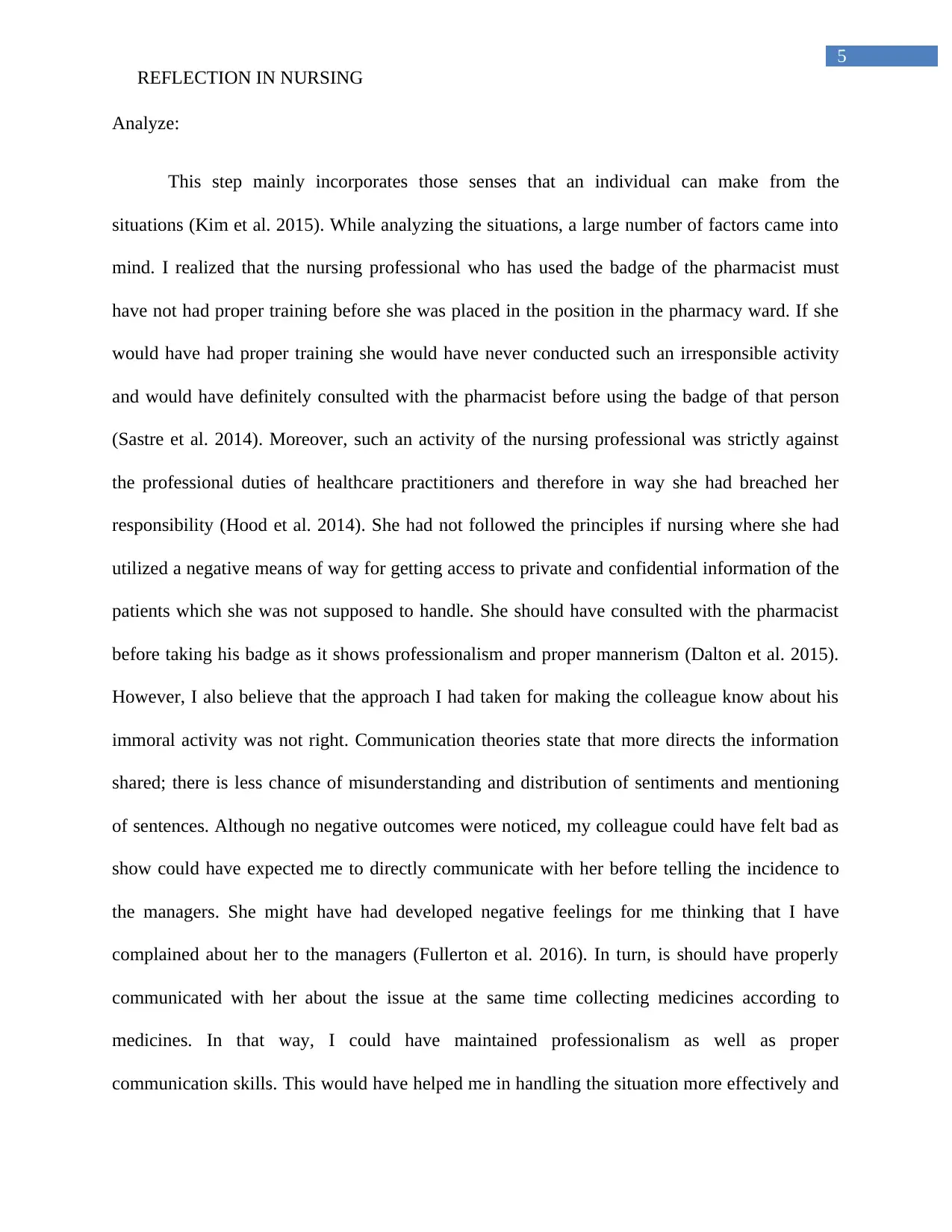
5
REFLECTION IN NURSING
Analyze:
This step mainly incorporates those senses that an individual can make from the
situations (Kim et al. 2015). While analyzing the situations, a large number of factors came into
mind. I realized that the nursing professional who has used the badge of the pharmacist must
have not had proper training before she was placed in the position in the pharmacy ward. If she
would have had proper training she would have never conducted such an irresponsible activity
and would have definitely consulted with the pharmacist before using the badge of that person
(Sastre et al. 2014). Moreover, such an activity of the nursing professional was strictly against
the professional duties of healthcare practitioners and therefore in way she had breached her
responsibility (Hood et al. 2014). She had not followed the principles if nursing where she had
utilized a negative means of way for getting access to private and confidential information of the
patients which she was not supposed to handle. She should have consulted with the pharmacist
before taking his badge as it shows professionalism and proper mannerism (Dalton et al. 2015).
However, I also believe that the approach I had taken for making the colleague know about his
immoral activity was not right. Communication theories state that more directs the information
shared; there is less chance of misunderstanding and distribution of sentiments and mentioning
of sentences. Although no negative outcomes were noticed, my colleague could have felt bad as
show could have expected me to directly communicate with her before telling the incidence to
the managers. She might have had developed negative feelings for me thinking that I have
complained about her to the managers (Fullerton et al. 2016). In turn, is should have properly
communicated with her about the issue at the same time collecting medicines according to
medicines. In that way, I could have maintained professionalism as well as proper
communication skills. This would have helped me in handling the situation more effectively and
REFLECTION IN NURSING
Analyze:
This step mainly incorporates those senses that an individual can make from the
situations (Kim et al. 2015). While analyzing the situations, a large number of factors came into
mind. I realized that the nursing professional who has used the badge of the pharmacist must
have not had proper training before she was placed in the position in the pharmacy ward. If she
would have had proper training she would have never conducted such an irresponsible activity
and would have definitely consulted with the pharmacist before using the badge of that person
(Sastre et al. 2014). Moreover, such an activity of the nursing professional was strictly against
the professional duties of healthcare practitioners and therefore in way she had breached her
responsibility (Hood et al. 2014). She had not followed the principles if nursing where she had
utilized a negative means of way for getting access to private and confidential information of the
patients which she was not supposed to handle. She should have consulted with the pharmacist
before taking his badge as it shows professionalism and proper mannerism (Dalton et al. 2015).
However, I also believe that the approach I had taken for making the colleague know about his
immoral activity was not right. Communication theories state that more directs the information
shared; there is less chance of misunderstanding and distribution of sentiments and mentioning
of sentences. Although no negative outcomes were noticed, my colleague could have felt bad as
show could have expected me to directly communicate with her before telling the incidence to
the managers. She might have had developed negative feelings for me thinking that I have
complained about her to the managers (Fullerton et al. 2016). In turn, is should have properly
communicated with her about the issue at the same time collecting medicines according to
medicines. In that way, I could have maintained professionalism as well as proper
communication skills. This would have helped me in handling the situation more effectively and
⊘ This is a preview!⊘
Do you want full access?
Subscribe today to unlock all pages.

Trusted by 1+ million students worldwide
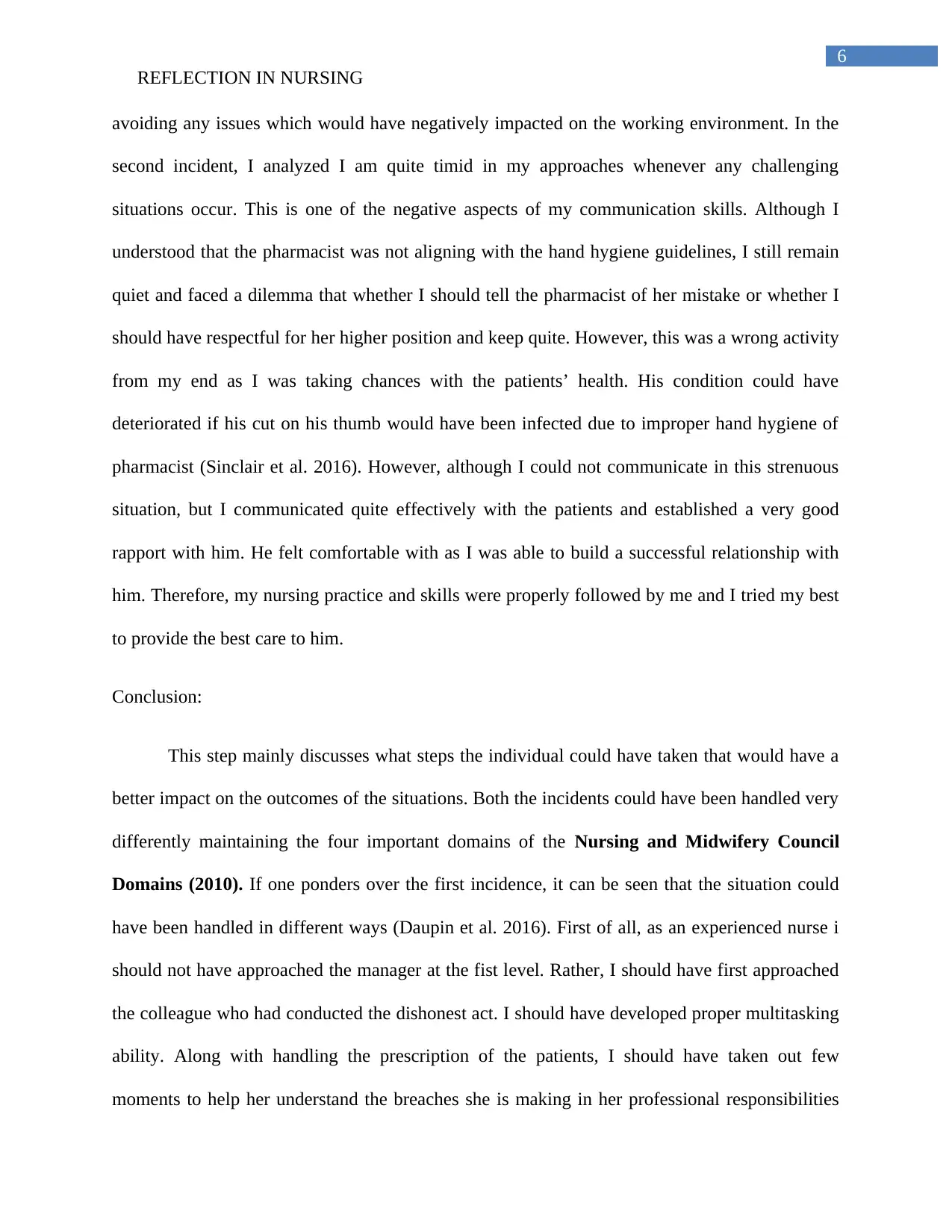
6
REFLECTION IN NURSING
avoiding any issues which would have negatively impacted on the working environment. In the
second incident, I analyzed I am quite timid in my approaches whenever any challenging
situations occur. This is one of the negative aspects of my communication skills. Although I
understood that the pharmacist was not aligning with the hand hygiene guidelines, I still remain
quiet and faced a dilemma that whether I should tell the pharmacist of her mistake or whether I
should have respectful for her higher position and keep quite. However, this was a wrong activity
from my end as I was taking chances with the patients’ health. His condition could have
deteriorated if his cut on his thumb would have been infected due to improper hand hygiene of
pharmacist (Sinclair et al. 2016). However, although I could not communicate in this strenuous
situation, but I communicated quite effectively with the patients and established a very good
rapport with him. He felt comfortable with as I was able to build a successful relationship with
him. Therefore, my nursing practice and skills were properly followed by me and I tried my best
to provide the best care to him.
Conclusion:
This step mainly discusses what steps the individual could have taken that would have a
better impact on the outcomes of the situations. Both the incidents could have been handled very
differently maintaining the four important domains of the Nursing and Midwifery Council
Domains (2010). If one ponders over the first incidence, it can be seen that the situation could
have been handled in different ways (Daupin et al. 2016). First of all, as an experienced nurse i
should not have approached the manager at the fist level. Rather, I should have first approached
the colleague who had conducted the dishonest act. I should have developed proper multitasking
ability. Along with handling the prescription of the patients, I should have taken out few
moments to help her understand the breaches she is making in her professional responsibilities
REFLECTION IN NURSING
avoiding any issues which would have negatively impacted on the working environment. In the
second incident, I analyzed I am quite timid in my approaches whenever any challenging
situations occur. This is one of the negative aspects of my communication skills. Although I
understood that the pharmacist was not aligning with the hand hygiene guidelines, I still remain
quiet and faced a dilemma that whether I should tell the pharmacist of her mistake or whether I
should have respectful for her higher position and keep quite. However, this was a wrong activity
from my end as I was taking chances with the patients’ health. His condition could have
deteriorated if his cut on his thumb would have been infected due to improper hand hygiene of
pharmacist (Sinclair et al. 2016). However, although I could not communicate in this strenuous
situation, but I communicated quite effectively with the patients and established a very good
rapport with him. He felt comfortable with as I was able to build a successful relationship with
him. Therefore, my nursing practice and skills were properly followed by me and I tried my best
to provide the best care to him.
Conclusion:
This step mainly discusses what steps the individual could have taken that would have a
better impact on the outcomes of the situations. Both the incidents could have been handled very
differently maintaining the four important domains of the Nursing and Midwifery Council
Domains (2010). If one ponders over the first incidence, it can be seen that the situation could
have been handled in different ways (Daupin et al. 2016). First of all, as an experienced nurse i
should not have approached the manager at the fist level. Rather, I should have first approached
the colleague who had conducted the dishonest act. I should have developed proper multitasking
ability. Along with handling the prescription of the patients, I should have taken out few
moments to help her understand the breaches she is making in her professional responsibilities
Paraphrase This Document
Need a fresh take? Get an instant paraphrase of this document with our AI Paraphraser
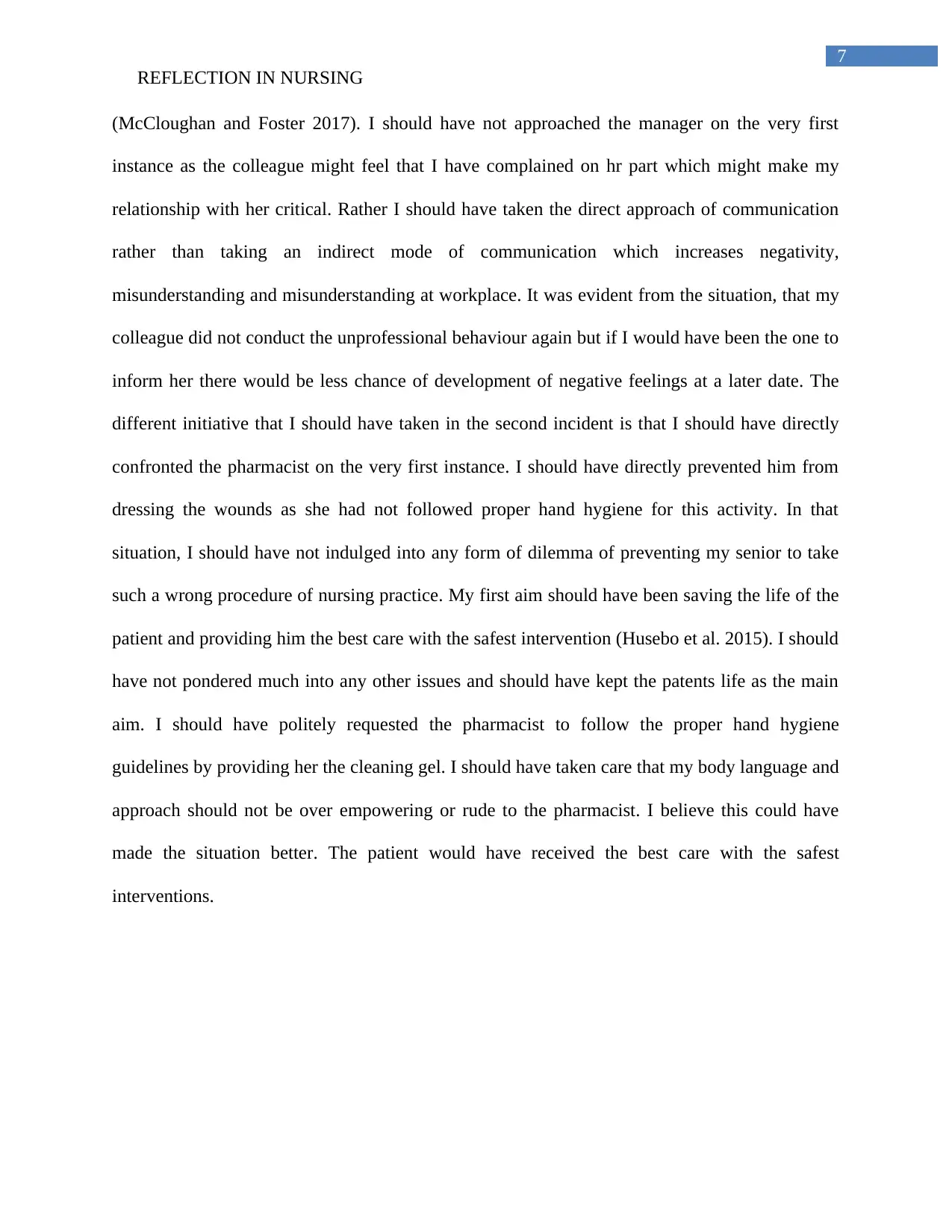
7
REFLECTION IN NURSING
(McCloughan and Foster 2017). I should have not approached the manager on the very first
instance as the colleague might feel that I have complained on hr part which might make my
relationship with her critical. Rather I should have taken the direct approach of communication
rather than taking an indirect mode of communication which increases negativity,
misunderstanding and misunderstanding at workplace. It was evident from the situation, that my
colleague did not conduct the unprofessional behaviour again but if I would have been the one to
inform her there would be less chance of development of negative feelings at a later date. The
different initiative that I should have taken in the second incident is that I should have directly
confronted the pharmacist on the very first instance. I should have directly prevented him from
dressing the wounds as she had not followed proper hand hygiene for this activity. In that
situation, I should have not indulged into any form of dilemma of preventing my senior to take
such a wrong procedure of nursing practice. My first aim should have been saving the life of the
patient and providing him the best care with the safest intervention (Husebo et al. 2015). I should
have not pondered much into any other issues and should have kept the patents life as the main
aim. I should have politely requested the pharmacist to follow the proper hand hygiene
guidelines by providing her the cleaning gel. I should have taken care that my body language and
approach should not be over empowering or rude to the pharmacist. I believe this could have
made the situation better. The patient would have received the best care with the safest
interventions.
REFLECTION IN NURSING
(McCloughan and Foster 2017). I should have not approached the manager on the very first
instance as the colleague might feel that I have complained on hr part which might make my
relationship with her critical. Rather I should have taken the direct approach of communication
rather than taking an indirect mode of communication which increases negativity,
misunderstanding and misunderstanding at workplace. It was evident from the situation, that my
colleague did not conduct the unprofessional behaviour again but if I would have been the one to
inform her there would be less chance of development of negative feelings at a later date. The
different initiative that I should have taken in the second incident is that I should have directly
confronted the pharmacist on the very first instance. I should have directly prevented him from
dressing the wounds as she had not followed proper hand hygiene for this activity. In that
situation, I should have not indulged into any form of dilemma of preventing my senior to take
such a wrong procedure of nursing practice. My first aim should have been saving the life of the
patient and providing him the best care with the safest intervention (Husebo et al. 2015). I should
have not pondered much into any other issues and should have kept the patents life as the main
aim. I should have politely requested the pharmacist to follow the proper hand hygiene
guidelines by providing her the cleaning gel. I should have taken care that my body language and
approach should not be over empowering or rude to the pharmacist. I believe this could have
made the situation better. The patient would have received the best care with the safest
interventions.
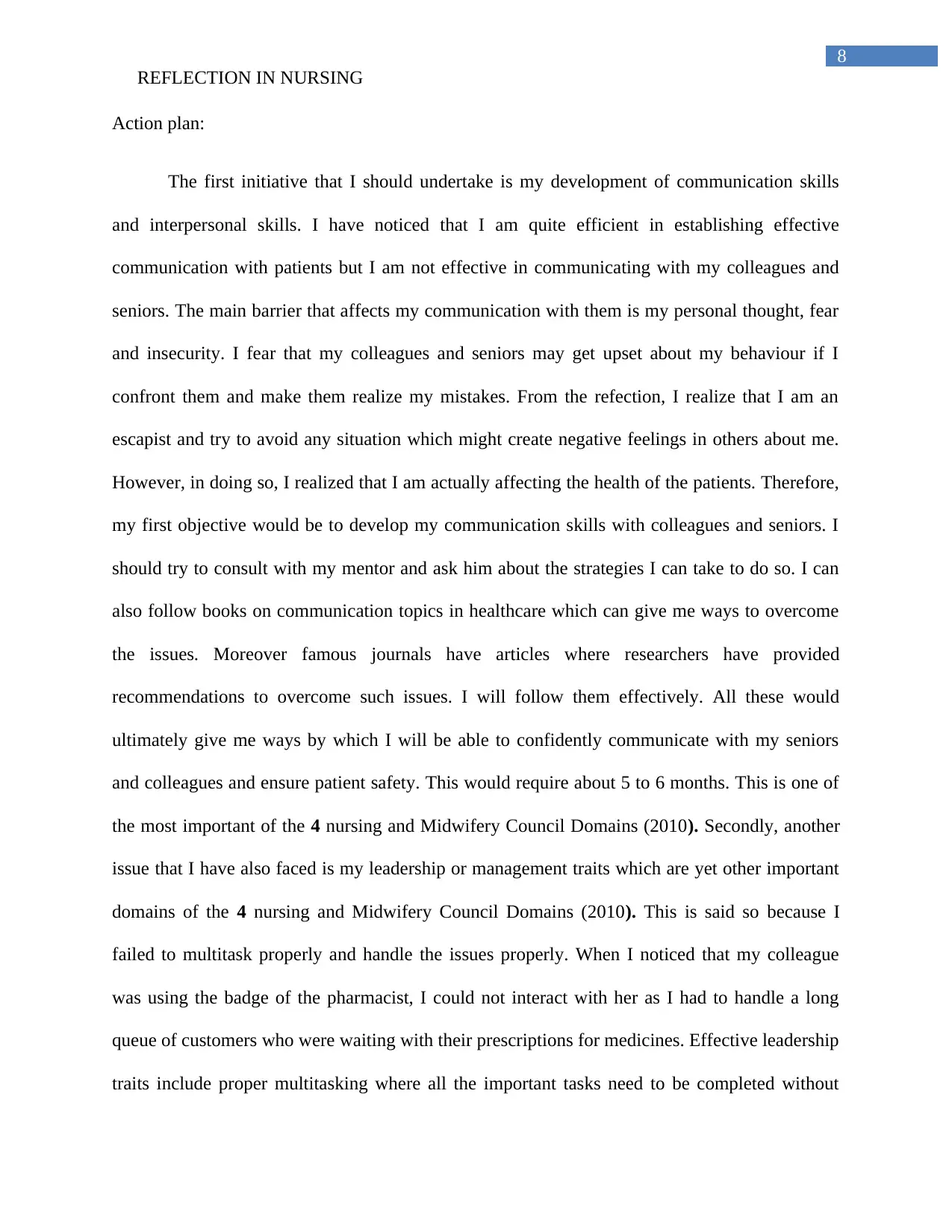
8
REFLECTION IN NURSING
Action plan:
The first initiative that I should undertake is my development of communication skills
and interpersonal skills. I have noticed that I am quite efficient in establishing effective
communication with patients but I am not effective in communicating with my colleagues and
seniors. The main barrier that affects my communication with them is my personal thought, fear
and insecurity. I fear that my colleagues and seniors may get upset about my behaviour if I
confront them and make them realize my mistakes. From the refection, I realize that I am an
escapist and try to avoid any situation which might create negative feelings in others about me.
However, in doing so, I realized that I am actually affecting the health of the patients. Therefore,
my first objective would be to develop my communication skills with colleagues and seniors. I
should try to consult with my mentor and ask him about the strategies I can take to do so. I can
also follow books on communication topics in healthcare which can give me ways to overcome
the issues. Moreover famous journals have articles where researchers have provided
recommendations to overcome such issues. I will follow them effectively. All these would
ultimately give me ways by which I will be able to confidently communicate with my seniors
and colleagues and ensure patient safety. This would require about 5 to 6 months. This is one of
the most important of the 4 nursing and Midwifery Council Domains (2010). Secondly, another
issue that I have also faced is my leadership or management traits which are yet other important
domains of the 4 nursing and Midwifery Council Domains (2010). This is said so because I
failed to multitask properly and handle the issues properly. When I noticed that my colleague
was using the badge of the pharmacist, I could not interact with her as I had to handle a long
queue of customers who were waiting with their prescriptions for medicines. Effective leadership
traits include proper multitasking where all the important tasks need to be completed without
REFLECTION IN NURSING
Action plan:
The first initiative that I should undertake is my development of communication skills
and interpersonal skills. I have noticed that I am quite efficient in establishing effective
communication with patients but I am not effective in communicating with my colleagues and
seniors. The main barrier that affects my communication with them is my personal thought, fear
and insecurity. I fear that my colleagues and seniors may get upset about my behaviour if I
confront them and make them realize my mistakes. From the refection, I realize that I am an
escapist and try to avoid any situation which might create negative feelings in others about me.
However, in doing so, I realized that I am actually affecting the health of the patients. Therefore,
my first objective would be to develop my communication skills with colleagues and seniors. I
should try to consult with my mentor and ask him about the strategies I can take to do so. I can
also follow books on communication topics in healthcare which can give me ways to overcome
the issues. Moreover famous journals have articles where researchers have provided
recommendations to overcome such issues. I will follow them effectively. All these would
ultimately give me ways by which I will be able to confidently communicate with my seniors
and colleagues and ensure patient safety. This would require about 5 to 6 months. This is one of
the most important of the 4 nursing and Midwifery Council Domains (2010). Secondly, another
issue that I have also faced is my leadership or management traits which are yet other important
domains of the 4 nursing and Midwifery Council Domains (2010). This is said so because I
failed to multitask properly and handle the issues properly. When I noticed that my colleague
was using the badge of the pharmacist, I could not interact with her as I had to handle a long
queue of customers who were waiting with their prescriptions for medicines. Effective leadership
traits include proper multitasking where all the important tasks need to be completed without
⊘ This is a preview!⊘
Do you want full access?
Subscribe today to unlock all pages.

Trusted by 1+ million students worldwide
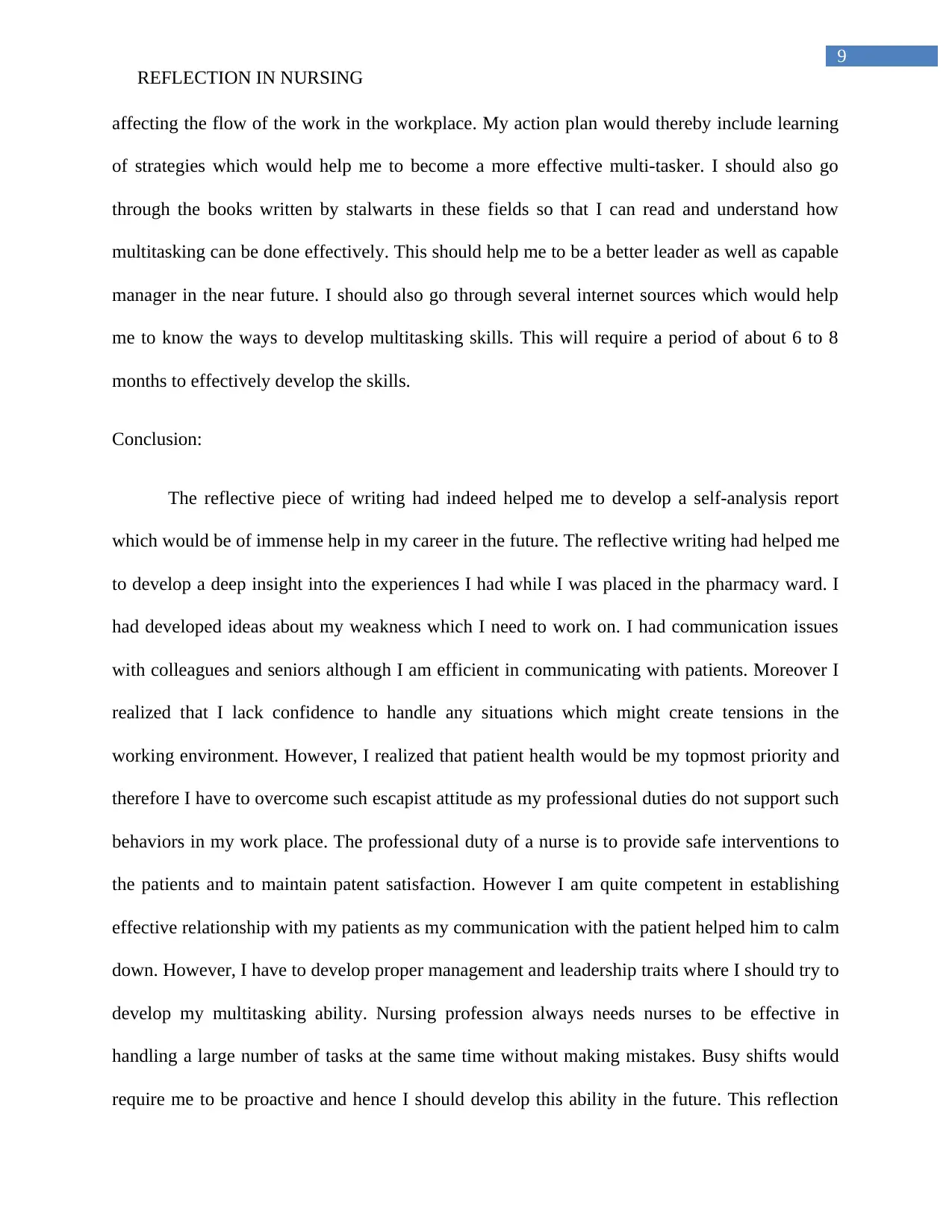
9
REFLECTION IN NURSING
affecting the flow of the work in the workplace. My action plan would thereby include learning
of strategies which would help me to become a more effective multi-tasker. I should also go
through the books written by stalwarts in these fields so that I can read and understand how
multitasking can be done effectively. This should help me to be a better leader as well as capable
manager in the near future. I should also go through several internet sources which would help
me to know the ways to develop multitasking skills. This will require a period of about 6 to 8
months to effectively develop the skills.
Conclusion:
The reflective piece of writing had indeed helped me to develop a self-analysis report
which would be of immense help in my career in the future. The reflective writing had helped me
to develop a deep insight into the experiences I had while I was placed in the pharmacy ward. I
had developed ideas about my weakness which I need to work on. I had communication issues
with colleagues and seniors although I am efficient in communicating with patients. Moreover I
realized that I lack confidence to handle any situations which might create tensions in the
working environment. However, I realized that patient health would be my topmost priority and
therefore I have to overcome such escapist attitude as my professional duties do not support such
behaviors in my work place. The professional duty of a nurse is to provide safe interventions to
the patients and to maintain patent satisfaction. However I am quite competent in establishing
effective relationship with my patients as my communication with the patient helped him to calm
down. However, I have to develop proper management and leadership traits where I should try to
develop my multitasking ability. Nursing profession always needs nurses to be effective in
handling a large number of tasks at the same time without making mistakes. Busy shifts would
require me to be proactive and hence I should develop this ability in the future. This reflection
REFLECTION IN NURSING
affecting the flow of the work in the workplace. My action plan would thereby include learning
of strategies which would help me to become a more effective multi-tasker. I should also go
through the books written by stalwarts in these fields so that I can read and understand how
multitasking can be done effectively. This should help me to be a better leader as well as capable
manager in the near future. I should also go through several internet sources which would help
me to know the ways to develop multitasking skills. This will require a period of about 6 to 8
months to effectively develop the skills.
Conclusion:
The reflective piece of writing had indeed helped me to develop a self-analysis report
which would be of immense help in my career in the future. The reflective writing had helped me
to develop a deep insight into the experiences I had while I was placed in the pharmacy ward. I
had developed ideas about my weakness which I need to work on. I had communication issues
with colleagues and seniors although I am efficient in communicating with patients. Moreover I
realized that I lack confidence to handle any situations which might create tensions in the
working environment. However, I realized that patient health would be my topmost priority and
therefore I have to overcome such escapist attitude as my professional duties do not support such
behaviors in my work place. The professional duty of a nurse is to provide safe interventions to
the patients and to maintain patent satisfaction. However I am quite competent in establishing
effective relationship with my patients as my communication with the patient helped him to calm
down. However, I have to develop proper management and leadership traits where I should try to
develop my multitasking ability. Nursing profession always needs nurses to be effective in
handling a large number of tasks at the same time without making mistakes. Busy shifts would
require me to be proactive and hence I should develop this ability in the future. This reflection
Paraphrase This Document
Need a fresh take? Get an instant paraphrase of this document with our AI Paraphraser
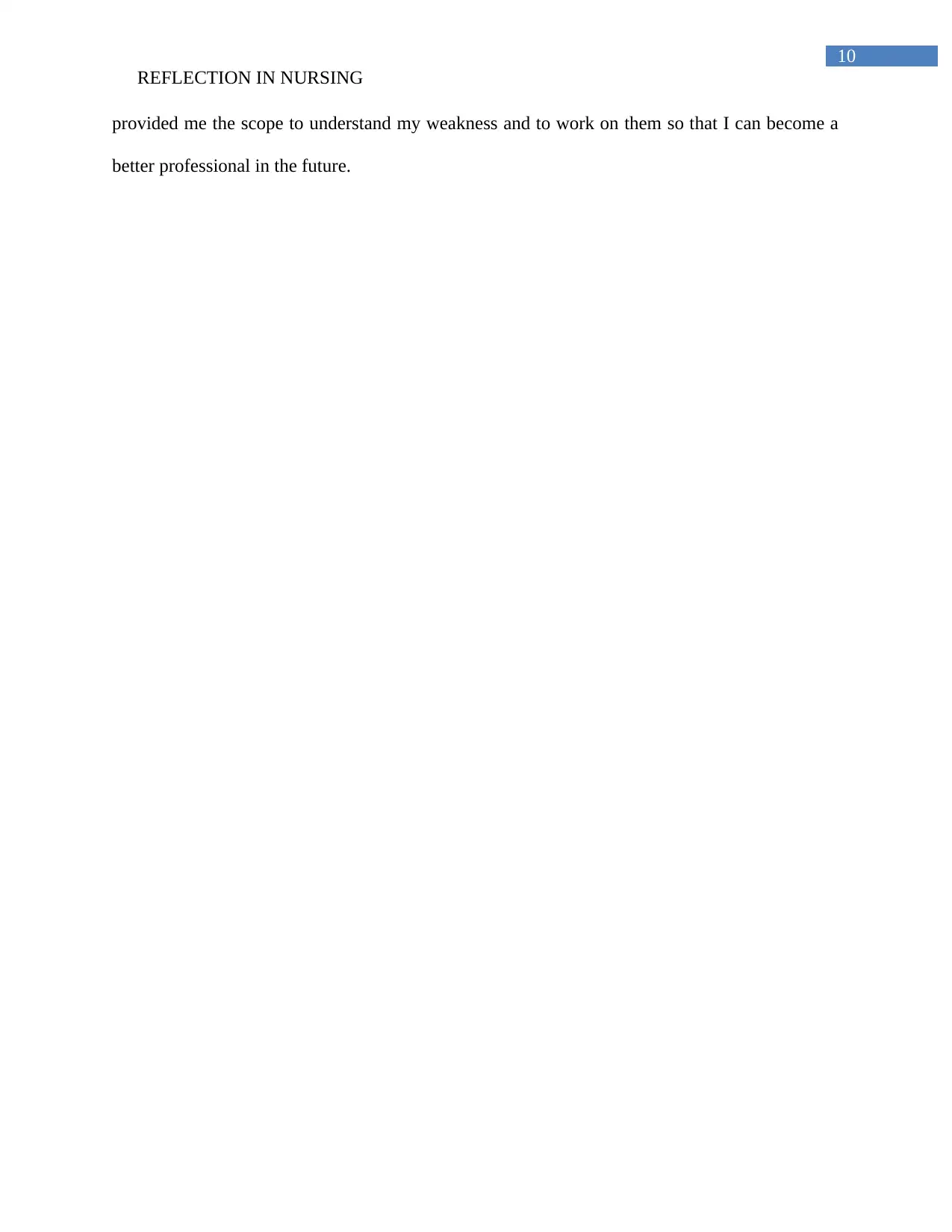
10
REFLECTION IN NURSING
provided me the scope to understand my weakness and to work on them so that I can become a
better professional in the future.
REFLECTION IN NURSING
provided me the scope to understand my weakness and to work on them so that I can become a
better professional in the future.
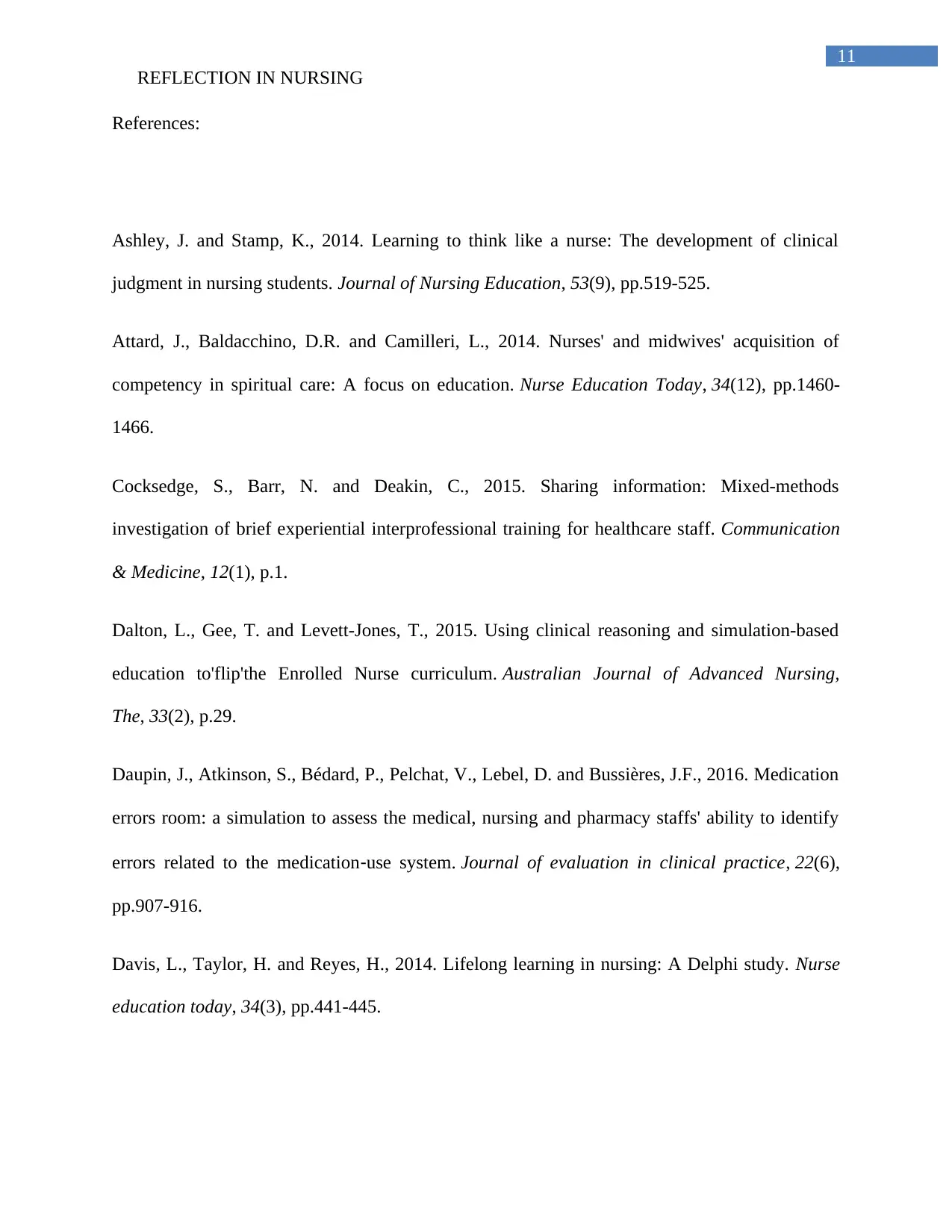
11
REFLECTION IN NURSING
References:
Ashley, J. and Stamp, K., 2014. Learning to think like a nurse: The development of clinical
judgment in nursing students. Journal of Nursing Education, 53(9), pp.519-525.
Attard, J., Baldacchino, D.R. and Camilleri, L., 2014. Nurses' and midwives' acquisition of
competency in spiritual care: A focus on education. Nurse Education Today, 34(12), pp.1460-
1466.
Cocksedge, S., Barr, N. and Deakin, C., 2015. Sharing information: Mixed-methods
investigation of brief experiential interprofessional training for healthcare staff. Communication
& Medicine, 12(1), p.1.
Dalton, L., Gee, T. and Levett-Jones, T., 2015. Using clinical reasoning and simulation-based
education to'flip'the Enrolled Nurse curriculum. Australian Journal of Advanced Nursing,
The, 33(2), p.29.
Daupin, J., Atkinson, S., Bédard, P., Pelchat, V., Lebel, D. and Bussières, J.F., 2016. Medication
errors room: a simulation to assess the medical, nursing and pharmacy staffs' ability to identify
errors related to the medication‐use system. Journal of evaluation in clinical practice, 22(6),
pp.907-916.
Davis, L., Taylor, H. and Reyes, H., 2014. Lifelong learning in nursing: A Delphi study. Nurse
education today, 34(3), pp.441-445.
REFLECTION IN NURSING
References:
Ashley, J. and Stamp, K., 2014. Learning to think like a nurse: The development of clinical
judgment in nursing students. Journal of Nursing Education, 53(9), pp.519-525.
Attard, J., Baldacchino, D.R. and Camilleri, L., 2014. Nurses' and midwives' acquisition of
competency in spiritual care: A focus on education. Nurse Education Today, 34(12), pp.1460-
1466.
Cocksedge, S., Barr, N. and Deakin, C., 2015. Sharing information: Mixed-methods
investigation of brief experiential interprofessional training for healthcare staff. Communication
& Medicine, 12(1), p.1.
Dalton, L., Gee, T. and Levett-Jones, T., 2015. Using clinical reasoning and simulation-based
education to'flip'the Enrolled Nurse curriculum. Australian Journal of Advanced Nursing,
The, 33(2), p.29.
Daupin, J., Atkinson, S., Bédard, P., Pelchat, V., Lebel, D. and Bussières, J.F., 2016. Medication
errors room: a simulation to assess the medical, nursing and pharmacy staffs' ability to identify
errors related to the medication‐use system. Journal of evaluation in clinical practice, 22(6),
pp.907-916.
Davis, L., Taylor, H. and Reyes, H., 2014. Lifelong learning in nursing: A Delphi study. Nurse
education today, 34(3), pp.441-445.
⊘ This is a preview!⊘
Do you want full access?
Subscribe today to unlock all pages.

Trusted by 1+ million students worldwide
1 out of 18
Related Documents
Your All-in-One AI-Powered Toolkit for Academic Success.
+13062052269
info@desklib.com
Available 24*7 on WhatsApp / Email
![[object Object]](/_next/static/media/star-bottom.7253800d.svg)
Unlock your academic potential
Copyright © 2020–2026 A2Z Services. All Rights Reserved. Developed and managed by ZUCOL.





